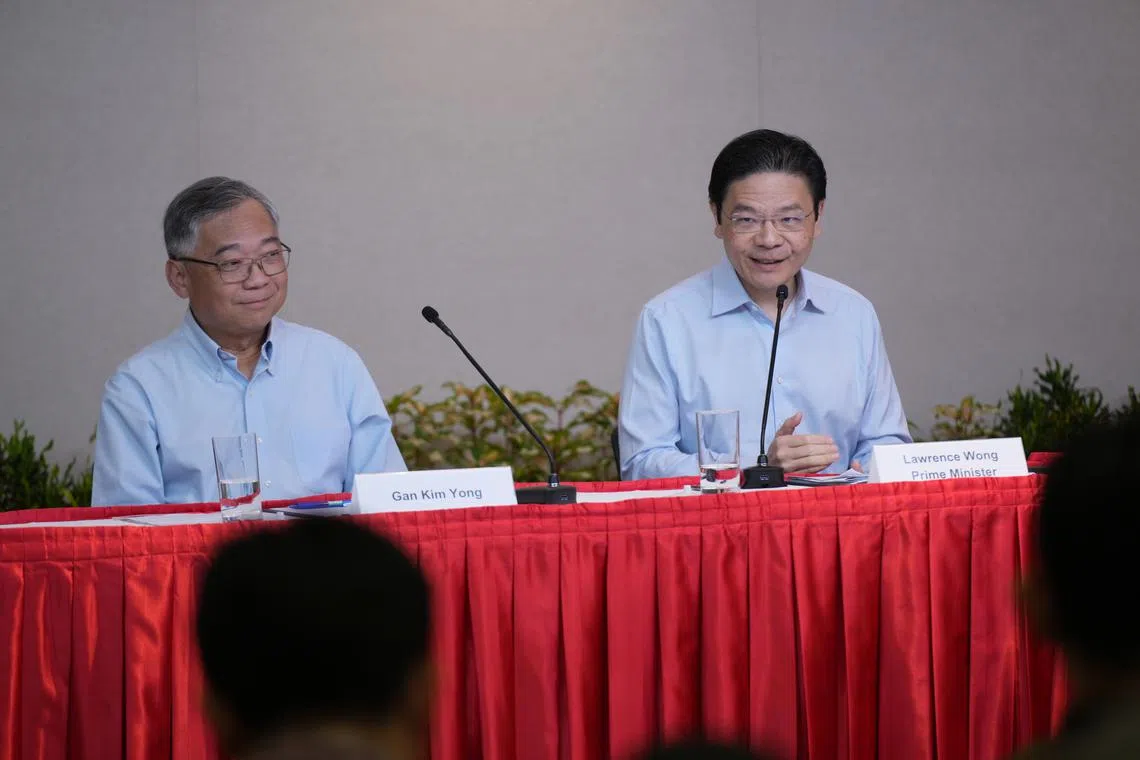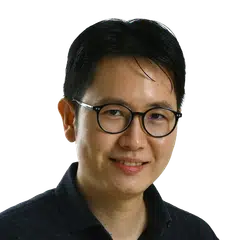News analysis
Continuity and change as experienced and fresh faces come together in PM Wong’s new Cabinet
Sign up now: Get ST's newsletters delivered to your inbox

PM Lawrence Wong (right) and DPM Gan Kim Yong at a press conference on May 21.
PHOTO: LIANHE ZAOBAO
Follow topic:
SINGAPORE - The biggest surprise of Prime Minister Lawrence Wong’s announcement of his new Cabinet on May 21 was, without doubt, his decision not to appoint a second deputy prime minister – noteworthy since Singapore has by custom had two DPMs since the 1980s.
Alongside the retention of experienced ministers in core portfolios such as finance, home affairs, foreign affairs and trade and industry, it would at first blush look like leadership renewal this time has mainly been at more junior levels, or due to gaps left by departing heavyweight ministers
For instance, Dr Ng’s retirement
Setting aside the question of a second DPM for the moment, this continuity belies the breadth of changes being made to the PAP’s governing team, which will see leadership overhauls across every ministry. Nine new office-holders were appointed
In explaining how he arrived at his Cabinet line-up
A world with rising trade barriers and sharper competition necessitates having old hands at the ministries leading Singapore’s economic agenda, he said. These include the Ministry of Finance, which remains under PM Wong, and the Ministry of Trade and Industry (MTI), under Deputy Prime Minister Gan Kim Yong.
A more uncertain world would also require experienced ministers at the helm of Singapore’s foreign policy and security agencies, said PM Wong, which is why Dr Vivian Balakrishnan will continue at the Ministry of Foreign Affairs, while Mr K. Shanmugam will step up to become Coordinating Minister for National Security while retaining his Home Affairs portfolio.
Domestically, Mr Ong Ye Kung continuing as Health Minister would allow him to carry on implementing major national programmes introduced in the previous term of government, such as Healthier SG, while Ms Grace Fu staying on as Minister for Sustainability and the Environment is key as matters such as water and food security become more vital in the face of climate change.
The message here is that inasmuch as leadership renewal is important, the Government’s foremost priority is to secure Singapore’s position in a changed world, especially in existential areas such as security and economic survival.
This also recalls the time-honoured advice by earlier PAP leaders such as Professor S. Jayakumar and Emeritus Senior Minister Goh Chok Tong not to change horses in mid-stream during challenging times.
While this meant there were few unexpected moves for the 4G ministers – Mr Chan, a former Chief of Army and Second Minister for Defence, was widely expected to helm Defence fully – PM Wong was able to make a good case for those he kept in place.
These include Dr Tan See Leng, who will stay on as a minister at MTI but has a sharpened focus on energy and science and technology; and Mrs Josephine Teo, who will remain at the Ministry of Digital Development and Information to oversee Singapore’s artificial intelligence and Smart Nation initiatives.
The similarity here is that these are either already the sine qua non of economic growth, or are expected to become critical growth engines in time to come.
At the same time, the refreshed line-up – a whopping 30 changes to portfolios below that of full minister – will allow younger leaders to gain experience and exposure across different areas of government, with the longer-term goal of having those who do well shoulder more responsibilities.
PM Wong was candid about what he is looking for in considering who to field in higher office. Besides policy mastery, whether an office-holder rises up the ranks will depend on their political skills, including the ability to communicate effectively and execute policies well.
Responding to a question about the current senior ministers of state, he said there is a high threshold of requirements to be able to operate and serve as a minister.
“Some are able to do this soon, and so we expose them, they are able to take on these responsibilities early,” he said. “Some may need more time to develop and grow in their job, and we allow them to do so.
“Some may not contribute at (ministerial) level, but their contributions are no less valued as a parliamentary secretary or as a minister of state.”
The principle here is that every member of government contributes to the best of their abilities and adds value to the team, regardless of the position they hold.
“When we can do that, the team operates at the maximum level, and then we can serve Singapore and Singaporeans effectively,” said PM Wong.

On his decision not to appoint a second deputy prime minister
“That’s a good configuration for now, and of course, along the way I may make further adjustments, where needed, as to our priorities,” he said.
The signal being sent was that PM Wong saw no need for being straitjacketed by the practices of his predecessors, but to mould his Cabinet to fit the needs of the times and to serve the needs of Singaporeans.
While Mr Shanmugam coordinates national security, Mr Chan will do so for public services, with the aim of improving last-mile delivery and roll-out of amenities for new estates. Meanwhile, Mr Ong has been tasked to coordinate social policies, reviewing and updating them as the economic environment and Singapore’s population evolve.
Implicit also was that meritocracy will remain the basis of promotion and that those who have been assessed to have the potential and ability will be stretched.
Top of this list are Mr Siow and Mr David Neo, who will be made acting ministers for Transport and Culture, Community and Youth respectively. This has been done before – both Mr Chan and Mr Ong were made acting ministers when they first entered politics.
Perhaps the best summation of PM Wong’s approach to his first post-general election Cabinet was made by new office-holder Jasmin Lau, the only first-term MP present with PM Wong and his key lieutenants at the May 21 press conference.
Ms Lau, who will become Minister of State for Education and for Digital Development and Information, said there is “no time to waste, but actually there is also no need for haste, and that’s the balance I think we have to strike”.
While the younger office-holders are raring to go and have the energy to contribute, Ms Lau said they also recognise the need to learn the ropes and to have clarity of purpose, given that any change to policies will have wide ramifications on Singaporeans. In that respect, there is much to learn – including getting up to speed on their portfolios and on how policies have evolved over time – and no time to waste, she added.
Such awareness, plus a considered mix of continuity and change, of experienced and young leaders, will hopefully give Singapore its best chance to keep shining in a troubled world.



